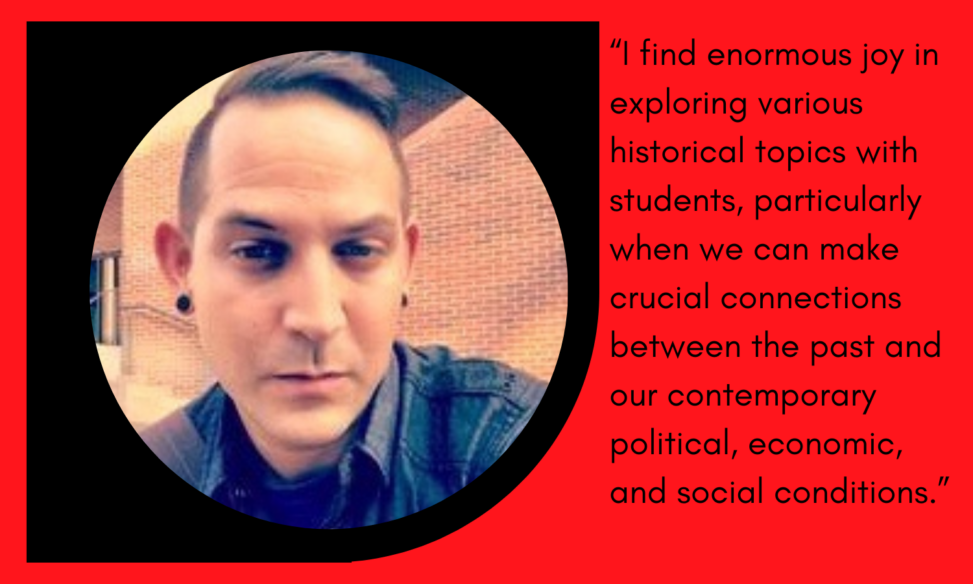I’m an Ohio native who has spent the entirety of my college experience at the University of Cincinnati, both as an undergrad and graduate student. In fact, I’ve earned two undergraduate degrees, an MA, and very soon a PhD-all from UC. You could certainly say that the place has become something of a “second home” over the years.
My interests are vast! Professionally, of course, my curiosities lie within the study of American history, but I am also fascinated with the practice and challenges of educating students on the topic. That said, I find enormous joy in exploring various historical topics with students, particularly when we can make crucial connections between the past and our contemporary political, economic, and social conditions. Frankly, I enjoy the entire process of planning and commencing with the courses I teach, as well as exploring diverse teaching methods. I could also be described as a “foodie,” and I enjoy cooking, traveling, music, graphic design, and visual art.
What are you up to these days?
I am an adjunct instructor for UC’s Department of History and am concurrently working on my dissertation, which I plan to defend this coming fall (2024). I also play guitar for a Cincinnati-based rock group called Archers Gate. Aside from that, I enjoy spending time with my spouse, Maria, and my children.
What brought you to history at UC?
In general, I’ve always had a deep interest in higher education, particularly the study of history and politics. From a very young age, writing was a skill that seemed to almost come naturally to me, which, as a history major in college, obviously proved extremely valuable. To that end, I think the overall combination of personal interests and academic strengths/skills guided me, even subconsciously at times, in my academic and career pursuits. From a more practical and perhaps economic standpoint, I’ve never been one to endeavor in things solely for the purpose of achieving financial and/or social stability. The idea of working in a private sector position, for instance, and establishing some routine just never appealed to me. Instead, I wanted to go after a career that allowed me to think about, research, and discuss important historical topics and themes central to understanding both the past and the present.
What did you focus on as a history student at UC?
My historical interests are broad, but I have primarily focused on topics concerning immigration, race, and the politics of whiteness within American history during the nineteenth and twentieth centuries.
Did you have any favorite history courses? Which ones and why?
It is difficult to name even a few of my favorite history courses at UC, as I truly found all to be interesting and important in one way or another. Perhaps some of the most enlightening courses dealt with the methodological aspects of studying history.
For example, I vividly remember Historical Thoughts and Methods with Dr. Robert Haug, as being especially impactful. Not only is Dr. Haug an excellent scholar and teacher, but he designed the course in a way that expanded my knowledge of the methodology and writing styles employed by historians. It was during Dr. Haug’s course that I not only decided to apply to the graduate program but also when I decided what kind of historian I wanted to be.
Another course that really left an impression was, of course, my senior capstone with Dr. Susan Longfield Karr. This was the first time that I was granted the opportunity to write an article-length paper on a topic of my choosing, incorporating my own primary and secondary sources to formulate my own original evidence-based argument. Like Dr. Haug, Dr. Longfield Karr was always accessible and attentive, challenging me and my classmates to become better writers.
What did you focus on in your capstone and why?
My capstone, “Delusions of the Past: Widespread Oblivion in the New Gilded Age,” argued how both a lack of historical memory and false narratives of the US’ past have coalesced to establish a twenty-first century that very much resembles the nation’s so-called “Gilded Age,” a period during the closing decades of the nineteenth century marked by enormous social and economic inequality. Although I would now consider this topic rather broad for a capstone, at the time, I was incensed by the rhetoric on display during the 2016 Presidential Election.
I won the George Newberger Prize for this capstone project.
What skills did you pick up from studying history that have served you well beyond your courses?
The writing and research skills obtained through the study of history are instrumental to those on the market for a job. The ability to synthesize a plethora of information from a variety of sources is a rare and desirable skill to most employers, as well as for everyday tasks. Through my years at UC, I have seen history graduates find careers in numerous areas, from government positions to private business.
Have any advice for current students?
The best advice I can give to current students is to pursue a field of study and a career that fits their interests and strengths. Be passionate about what you decide to do in life.
